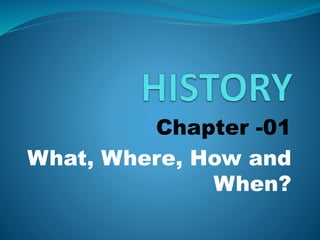
What, Where, How and When? NCERT Class VI
- 1. Chapter -01 What, Where, How and When?
- 2. HISTORY The word “History” was derived from Greek word “Historia” which means “Inquiry” or “Knowledge”. The purpose of studying History was “ To know about the past”. History will help us to understand how this Present evolved.
- 3. WHAT, WHERE, HOW AND WHEN? What happened? Where it was happened? How it was happened? When it was happened?
- 4. Time frame of History: Historians use chronological sequence for a better understanding. Birth of Jesus Christ has been taken as year zero. Any event before Christ is called Before Christ (BC) and any event after the birth of Jesus is called Anno Domini (AD).
- 6. LETTERS WITH DATES: BC, we have seen stands for ‘Before Christ.’ You will sometimes find AD before dates. This stands for two Latin words, ‘Anno Domini’, meaning ‘in the year of the Lord’. So 2020 can also be written as AD 2020.
- 7. What can we know about the past? What people ate? The kinds of clothes they wore, The houses in which they lived. We can find about the lives of Hunters, Herders, Farmers, Rulers, Merchants, Priests, Crafts persons, Artists, Musicians and Scientists. We can also find out about the games children Played, the stories they heard, the songs they sang.
- 8. WHERE DID PEOPLE LIVE?
- 9. River Narmada: People lived along the banks of Narmada River for several thousand years. Gatherers Collected food and also hunted animals.
- 10. Sulaiman and Kirthar hills- Northwest: First began to grow crops such as Wheat and Barley- 8000 years ago. Rearing animals like Sheep, Goat and Cattle. Lived in village.
- 11. Garo hills to the North-East and the vindhyas in central India: Agricultural development. Vindhyas- place where rice was first grown.
- 12. River Indus and its Tributaries: 4700 years ago- earliest cities flourished on the banks of these river.
- 13. Ganga and its tributary son: 2500 years ago- cities started developing. The South of the Ganga was know as Magadha now lying in the Bihar. Rulers were very powerful. They setup large Kingdom.
- 14. People travelled from one place to another place: The hills, mountains, deserts, rivers and seas made journeys dangerous at times, but never impossible. People searched for their livelihood, Escape from Natural disasters, Conquering other’s lands, Merchants travelled with Caravans or Ships, carrying valuable goods, Religious teacher walked from village to village, town to town, stopping to offer instruction and advice on the way. Spirit of Adventure, wanting to discover new and exciting places.
- 15. Names of the land: Two of the words we often use for our country are India and Bharat. The word India comes from the Indus called Sindhu in Sanskrit. 2500 years ago- Iranians and Greek called the river Hindos or Indos. The land to the east of the river was called India. Bharat- Group of people lived in the North-west, Mentioned in Rig Veda. Rig Veda was a earliest composition in Sanskrit.
- 16. Finding out about the past: There are several ways to finding out about the past. They are •Archaeological Source, •Literary Source.
- 17. MANUSCRIPTS:
- 18. MANUSCRIPTS: The books were written long ago were called Manuscripts. It’s a Latin word “ Manu”, meaning “Hand”. These were usually written on Palm leaf or Bark of a tree know as Birch, which grows in Himalayas.
- 19. • These books deals with all kinds of subjects: Religious beliefs and Practices, Lives of kings, Medicine and science, Epics( Ramayana, Mahabratha etc..), Poems, Plays. •Written in Sanskrit, Prakrit and Tamil. •It was preserved in Temples and Monasteries.
- 20. INSCRIPTIONS:
- 21. INSCRIPTIONS: Written on Stone or Metal. Sometimes, Kings got their orders inscribed so that People could See, Read and Obey them. Kings records their victories in battle.
- 22. •The study of human history and prehistory through the excavation of sites and the analysis of physical remains •They study the remains of buildings made of stone and bricks, painting and sculpture. •Find tools, weapons, pots, pans, Ornaments and coins. ARCHAEOLOGISTS:
- 25. HISTORIANS: The person who study the past, often use the word source to refer to the information found from Manuscripts, Inscriptions and Archaeology. Once source are found, learning about the past becomes an Adventure, as we reconstruct it bit by bit. So Historians and Archaeologists are like detectives.
- 26. ONE PAST OR MANY? We have used the word ‘pasts’ in plural to draw attention to the fact that the past was different for different groups of people. FOR EXAMPLE: the lives of Farmers were different from lives of kings and queen. Even today, people followed different practice and customs in different parts of the country.
- 29. •There was another kind of difference. •Kings kept their records of their victories. •But, ordinary people such as Hunters, Fisher man, Farmers did not keep records of what they did. •While, archaeology helps us to find out about their lives, there is much that remains unknown.
- 30. ROSETTA INSCRIPTION: Rosetta is town on the North coast of Egypt. Scholars who could read Greek figured out that the names of Kings and Queen were enclose in the little frame, called a Cartouche.